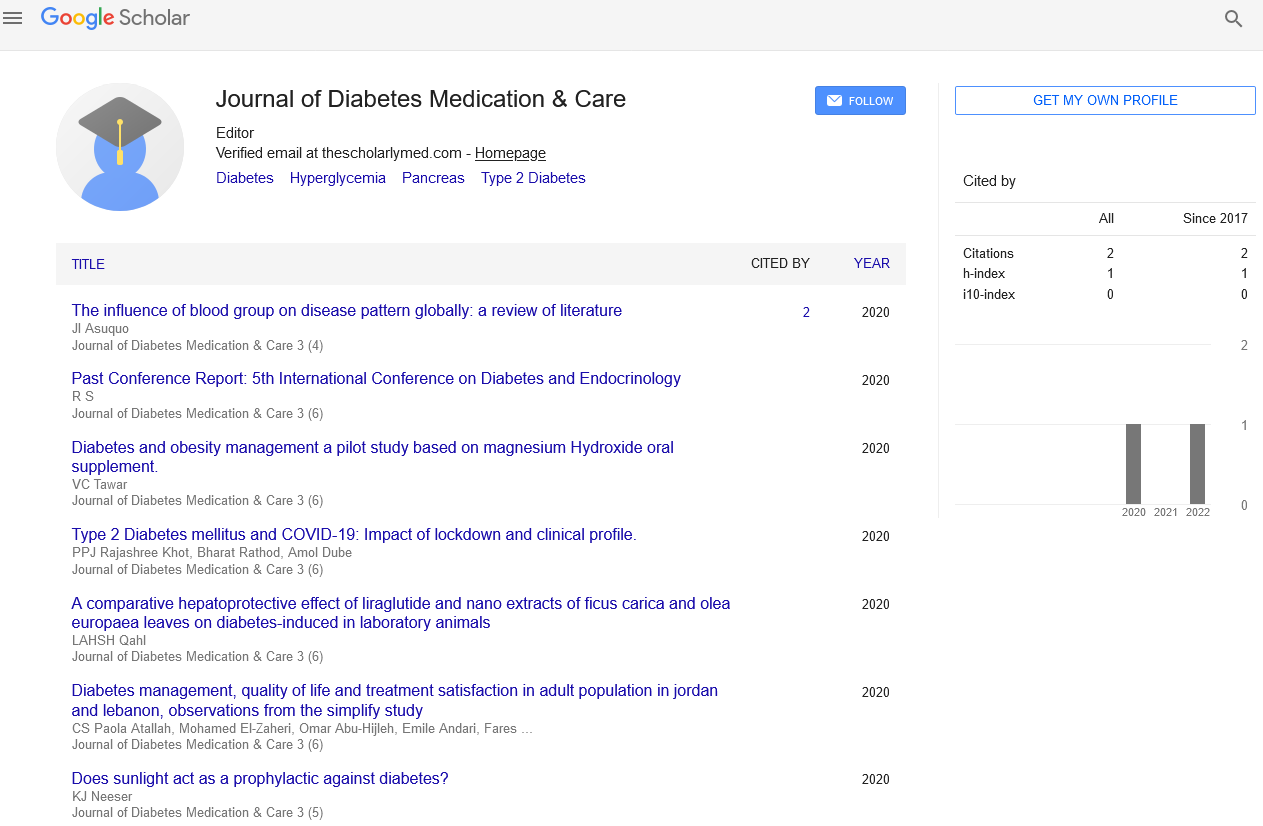Perspective - Journal of Diabetes Medication & Care (2024) Volume 7, Issue 3
Harnessing Hope: β Cell Regeneration and Immunotherapy as Revolutionary Treatments for Diabetes
- Corresponding Author:
- Guana Lauang
Department of Immunotherapy, University of Paris, Paris, France
E-mail: guanalaung@126.com
Received: 02-May-2024, Manuscript No. JDMC-24-136442; Editor assigned: 06-May-2024, PreQC No. JDMC-24-136442 (PQ); Reviewed: 20-May-2024, QC No. JDMC-24-136442; Revised: 03-Jun-2024, Manuscript No. JDMC-24-136442 (R); Published: 11-Jun-2024, DOI: 10.37532/JDMC.2024.7(3).206-207
Introduction
Diabetes, a chronic metabolic disorder characterized by elevated blood sugar levels, affects millions of people worldwide. While current treatments focus on managing symptoms, the quest for a cure has led researchers to explore ground breaking approaches centered on β cell regeneration and immunotherapy. In this article, we delve into the promising potential of these innovative treatments in revolutionizing diabetes care and offering hope to those living with this challenging condition.
Description
Understanding diabetes and its challenges
Diabetes encompasses a group of diseases characterized by the body’s inability to properly regulate blood sugar levels. Type 1 diabetes results from the autoimmune destruction of insulin-producing β cells in the pancreas, while type 2 diabetes typically involves insulin resistance and impaired β cell function. Both types of diabetes can lead to serious complications, including cardiovascular disease, kidney failure, and vision loss.
Current treatments for diabetes primarily focus on managing blood sugar levels through lifestyle modifications, oral medications, insulin therapy, and other interventions. While these approaches can effectively control symptoms and prevent complications, they do not address the underlying mechanisms driving the disease. As a result, there is a growing need for innovative therapies capable of restoring β cell function and halting the progression of diabetes.
β cell regeneration: Unlocking the potential for cure
β cells play a critical role in maintaining glucose homeostasis by producing and secreting insulin in response to changes in blood sugar levels. In individuals with type 1 diabetes, the destruction of β cells leads to insulin deficiency, necessitating lifelong insulin therapy. However, recent research has focused on regenerating or replacing these lost β cells as a potential cure for the disease.
One approach to β cell regeneration involves stimulating the proliferation of existing β cells within the pancreas. Researchers have identified various signalling pathways and growth factors that can promote β cell replication in animal models. Additionally, advances in stem cell research hold promise for generating new β cells from pluripotent stem cells or inducing the reprogramming of other cell types into insulin-producing cells.
Another strategy for β cell regeneration involves transplanting functional β cells into individuals with diabetes. While traditional islet cell transplantation has shown promise in restoring insulin production, challenges such as donor scarcity, immune rejection, and the need for lifelong immunosuppression limit its widespread application. However, emerging technologies such as encapsulation devices and gene editing techniques offer potential solutions to overcome these obstacles and improve the long-term viability of transplanted β cells.
Immunotherapy: Restoring immune tolerance to preserve β cells
In type 1 diabetes, the immune system mistakenly attacks and destroys insulin-producing β cells, leading to insulin deficiency and hyperglycemia. Immunotherapy aims to modulate the immune response and restore immune tolerance to prevent further β cell destruction. Several approaches to immunotherapy are being explored, including:
Antigen-specific therapies: These therapies target specific antigens involved in the autoimmune response against β cells, such as insulin or Glutamic Acid Decarboxylase (GAD). By inducing immune tolerance to these antigens, antigen-specific immunotherapies aim to prevent further β cell destruction and preserve remaining β cell function.
Immune checkpoint inhibitors: Immune checkpoint inhibitors target molecules that regulate immune cell activity, such as Cytotoxic T-lymphocyte-Associated Protein 4 (CTLA-4) and Programmed cell Death Protein 1 (PD-1). By blocking these inhibitory pathways, immune checkpoint inhibitors enhance the immune response against autoimmune attacks on β cells and promote β cell survival.
Regulatory T cell therapy: Regulatory T cells (Tregs) play a crucial role in maintaining immune tolerance and preventing autoimmune responses. Therapies aimed at expanding and enhancing the function of Tregs offer a promising approach to restoring immune balance and preserving β cell function in individuals with type 1 diabetes.
Combining β cell regeneration and immunotherapy: A synergistic approach
While β cell regeneration and immunotherapy represent distinct approaches to treating diabetes, emerging evidence suggests that combining these strategies may offer synergistic benefits. By simultaneously promoting β cell regeneration and modulating the immune response, combination therapies have the potential to achieve greater and more durable outcomes in preserving β cell function and controlling blood sugar levels.
Conclusion
β cell regeneration and immunotherapy hold immense promise as transformative treatments for diabetes, offering hope for a cure and improved quality of life for millions of individuals worldwide. While significant challenges remain, ongoing research efforts continue to advance our understanding of the underlying mechanisms of diabetes and develop innovative therapies to address them. By harnessing the power of β cell regeneration and immunotherapy, we move closer to realizing the vision of a world free from the burden of diabetes.

